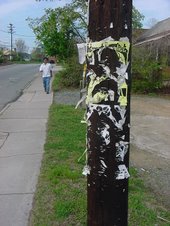 Chapel Hill Herald
Chapel Hill HeraldTuesday July 02, 2002
By RAY GRONBERG
Page 1
CHAPEL HILL - A shakeup of Chapel Hill's rules on flyers and political signs is likely after the Town Council gets back from its summer recess.
Council members have tentatively endorsed an ordinance that would do away with a restriction on the number of campaign signs on private property, and a time limit on their display.
The 5-4 decision also would loosen a size restriction that applies to temporary banners, like the one that provoked last September's "woe to our enemies" flap between town officials and a Franklin Street restaurant owner.
The narrow margin of the vote means that council members will have to hold a second ballot on the ordinance when they reconvene in late August, but passage seems assured.
"There are arguments that limiting speech in that way, as far as political signs go, is unconstitutional," said Mark Kleinschmidt, one of the council members who voted for the change. "Even if it's not, I don't think it's necessary that we regulate that to the full extent of our power."
Kleinschmidt and five of his colleagues also joined forces last week to instruct Town Manager Cal Horton to prepare a second ordinance that would do away with Chapel Hill's ban on attaching flyers to phone and light poles.
The move answered a West Rosemary Street record-store owner, Erik Ose, who sought the ban's repeal after police ticketed him in April for putting up flyers that advertised a "banquet for global peace and justice."
The repeal ordinance should be ready after the council's summer break and will include a provision that allows the Public Works Department to strip flyers off poles up to once a week.
The twin votes capped several months of debate about the town's sign rules that began when zoning inspectors made restaurant owner Scott Maitland take down the "woe to our enemies" banner.
Maitland's banner ran afoul of the town's existing regulation because it was four times larger than allowed.
But the removal triggered complaints because the banner's wording - which voiced Maitland's reaction to the Sept. 11 terrorist attacks on New York and Washington - had drawn objections from a trio of council members who thought it too bellicose.
A subsequent review by administrators found that some of the rules were too strict to survive a court challenge.
The limit on the number of campaign signs a resident can post on private property clearly fell into that category, as the town was only allowing one. The federal appeals court that hears cases from North Carolina has said a two-sign limit is unconstitutional.
Officials also had doubts about the time limit that applies to campaign signs. The town currently allows them to go up 30 days before an election and requires that they be taken down within seven days after voting.
The upcoming change would waive those restrictions entirely for signs on private property and loosen them for postings on the public right of way. The new right of way limits would allow postings 45 days before an election and up to 12 days after one.
Ose's repeal request arrived after the ordinance review was under way, and targeted a section of the town code that hadn't gotten council scrutiny until he spoke up.
The flyer ban applies to any posting, whether it advertises a business or a political viewpoint.
A trio of council members - Flicka Bateman, Pat Evans and Jim Ward - voted against both proposals last week. Mayor Kevin Foy joined them in voting against the changes to the rules on campaign signs.
Bateman and Ward indicated that they had more objections to repealing the flyer ban. They and Evans noted that light poles are private property, which makes attaching flyers to them a form of trespassing.
Evans and Bateman added that flyers would only mean more visual clutter and litter on the town's streets, especially if they proliferate after the ban's repeal.
"Some people think this is only going to be the downtown, and it's not, it's going to be throughout the town," Evans said. "There's the possibility that some very offensive signs could be put up because there's no regulating them at all. And I don't know how we could possibly afford to take them down each week throughout the community."
Bateman agreed.
"People have made such a big thing about the entryways into Chapel Hill, but there are utility poles that line the entryways into Chapel Hill," she said. "And that would be a great place to advertise everything from 'free haircuts' to 'Viva Castro.' "
But Kleinschmidt said the town barely enforces the existing restrictions, a stance that undercuts the rule of law.
"It basically distills down into government giving citizens a message that 'we're in control and don't you forget about it,' " he said. "I don't think that's good policy. If we have laws on the books that aren't being enforced, we need to change them."
